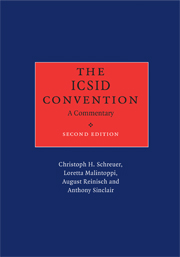Book contents
- Frontmatter
- Contents
- Foreword by Professor Sir Elihu Lauterpacht, CBE, QC
- Authors' preface to the second edition
- Table of cases
- List of abbreviations
- Text of the ICSID Convention
- Procedural calendar
- PREAMBLE
- CHAPTER I International Centre for Settlement of Investment Disputes
- CHAPTER II Jurisdiction of the Centre
- CHAPTER III Conciliation
- Article 28 Request for Conciliation
- Article 29 Composition of Commission
- Article 30 Appointment by Chairman
- Article 31 Qualities of Conciliators
- Article 32 Decision on Jurisdiction
- Article 33 Rules on Procedure
- Article 34 Conciliation Proceedings and Report
- Article 35 Non-Invocation in Subsequent Proceedings
- CHAPTER IV Arbitration
- CHAPTER V Replacement and Disqualification of Conciliators and Arbitrators
- CHAPTER VI Cost of Proceedings
- CHAPTER VII Place of Proceedings
- CHAPTER VIII Disputes between Contracting States
- CHAPTER IX Amendment
- CHAPTER X Final Provisions
- Final Clause
- Consolidated bibliography
- Index by article
- Index by subject
Article 32 - Decision on Jurisdiction
from CHAPTER III - Conciliation
Published online by Cambridge University Press: 07 September 2010
- Frontmatter
- Contents
- Foreword by Professor Sir Elihu Lauterpacht, CBE, QC
- Authors' preface to the second edition
- Table of cases
- List of abbreviations
- Text of the ICSID Convention
- Procedural calendar
- PREAMBLE
- CHAPTER I International Centre for Settlement of Investment Disputes
- CHAPTER II Jurisdiction of the Centre
- CHAPTER III Conciliation
- Article 28 Request for Conciliation
- Article 29 Composition of Commission
- Article 30 Appointment by Chairman
- Article 31 Qualities of Conciliators
- Article 32 Decision on Jurisdiction
- Article 33 Rules on Procedure
- Article 34 Conciliation Proceedings and Report
- Article 35 Non-Invocation in Subsequent Proceedings
- CHAPTER IV Arbitration
- CHAPTER V Replacement and Disqualification of Conciliators and Arbitrators
- CHAPTER VI Cost of Proceedings
- CHAPTER VII Place of Proceedings
- CHAPTER VIII Disputes between Contracting States
- CHAPTER IX Amendment
- CHAPTER X Final Provisions
- Final Clause
- Consolidated bibliography
- Index by article
- Index by subject
Summary
Art. 32 is the first Article in the Section on “Conciliation Proceedings”. Other Articles in this Section deal with the Conciliation Rules (Art. 33), the conduct of conciliation (Art. 34) and the prohibition to rely on statements made in the course of conciliation in other proceedings (Art. 35).
Art. 32 is substantively identical to Art. 41, its counterpart in the Chapter on Arbitration. The only difference is the substitution of the word “Commission” for “Tribunal”.
Art. 32 was drafted in close conjunction with Art. 41. All drafts provided in identical terms that commissions and tribunals, respectively, would be judges of their own competence (History, Vol. I, pp. 154, 156, 186, 188). There was practically no separate discussion of this provision concerning its relation to conciliation commissions (History, Vol. II, pp. 399, 408, 508, 783, 784, 791, 800, 946). An inconclusive discussion on whether a decision by a conciliation commission on its competence should only be a non-binding recommendation (at pp. 206, 407/8) is not reflected in the Convention's text. The idea to submit the question of jurisdiction in conciliation proceedings to separate arbitration was dropped at an early stage of the drafting (at p. 156).
- Type
- Chapter
- Information
- The ICSID ConventionA Commentary, pp. 439 - 440Publisher: Cambridge University PressPrint publication year: 2009



